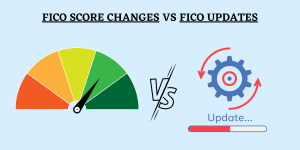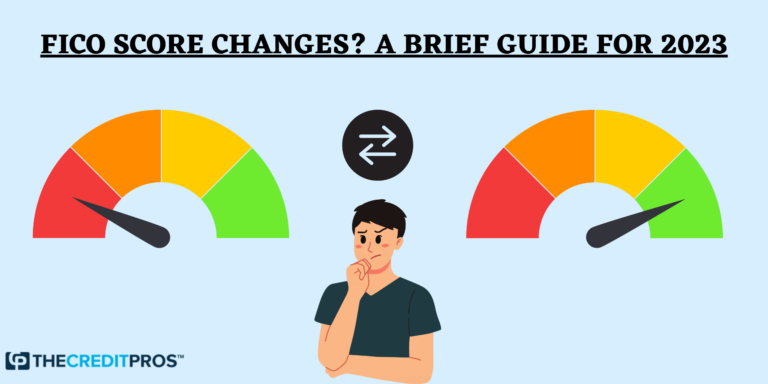FICO Score Changes – A Brief Guide for 2023
Table of Contents
FICO Score Changes – A Brief Guide for 2023
Are you worried that your credit score is changing occasionally without you noticing it? Unanticipated credit score changes may be due to updates released in the FICO credit scoring models. Another reason is that the credit scores themselves are updated every month by the three major credit bureaus Experian, Equifax, and TransUnion. Let us explore the different reasons why your FICO score changes and the possible explanations of each factor in this article.FICO Score
FICO, originally Fair, Isaac, and Company, was introduced in 1989 as the first broad-based consumer credit score system. FICO score is acknowledged and accepted by most financial institutions for determining the creditworthiness of customers.FICO Score Changes vs FICO Updates

FICO Score Changes vs FICO Updates
FICO scores get updated every month as the billing cycle, interest rate, and equated monthly installments (EMIs) are calculated on a monthly basis and they reflect the current credit scores. Whereas, a FICO score change can happen when FICO releases a new credit scoring model that alters the existing score. The credit scoring models are not designed to reduce the credit scores of customers but are primarily used to evaluate the credit risk of customers by lenders. It is formulated so that newer versions of scoring models outperform the previous versions. Additionally, credit updates monitor your report or credit history for on-time payments, credit accounts, lines of credit, and personal information. The FICO score is calculated based on these criteria and has a higher chance of increasing if you make timely payments and maintain a good credit utilization ratio.
Other Factors Related to FICO Score Changes
Apart from the factors mentioned above, your credit score is affected by credit checks. Let us explore the difference between soft and hard credit inquiries or checks.Soft Inquiry or Soft Credit Check:
A soft credit check is when you submit an application to check your credit score from the credit bureau. This is made for self-evaluation or self-reference purposes and it does not affect your credit score.Hard Inquiry or Hard Credit Check:
A hard inquiry is when a credit reporting agency or lenders request the credit bureaus for your credit report for processing loan applications. This credit check affects your credit score by reducing 5 points (ideally) and it can stay on your report for a year.Recent Changes in FICO Scoring Models

FICO Score Changes – FICO Credit Scoring Models
Credit scoring models are not used to calculate credit scores but rather help lenders evaluate your creditworthiness while offering loans. A typical credit score ranges from 300 to 850 and the FICO credit scoring model includes the following ranges:
Credit scoring models are not used to calculate credit scores but rather help lenders evaluate your creditworthiness while offering loans. A typical credit score ranges from 300 to 850 and the FICO credit scoring model includes the following ranges:
- Poor (300-579) – It is hard to qualify for most loans and has little to no chance of approval. (It is only possible to qualify with high-interest rates, EMIs, and a high down payment)
- Fair (580-669) – It is possible to qualify for loans but with high upfront deposit and interest rates (you could qualify for personal loans)
- Good (670-739) – You will qualify for most loan options in the good credit range.
- Very Good (740-799) – Get the best deals out of lenders in shorter terms and lower interest rates.
- Excellent (800-850) – the maximum range with customers showing high credit and debt management characteristics.
Frequently Asked Questions
1. Which FICO credit score model is most commonly used?
The FICO 8 model is the most used scoring model and is used for auto and bank card financing. FICO 8 is widely recognized for loan approval by credit agencies.2. Why does my FICO score change?
The following are the probable reasons for changes in FICO scores:- Due to soft or hard inquiries
- Whenever FICO releases a new credit scoring model, or
- due to the update in scores by credit bureaus on a regular basis.



